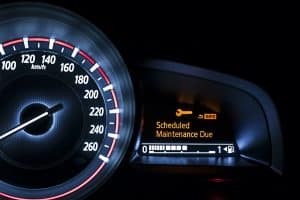As an Audi owner, you understand the blend of luxury and performance your vehicle offers. To maintain this peak condition, Audi employs sophisticated systems, including service and inspection reminders. When your dashboard displays “Inspection Due,” it’s a clear signal from your vehicle that it’s time for a check-up. Understanding what this message means, and acting on it promptly, is crucial for your Audi’s longevity and your peace of mind.
 Audi Dashboard Service Light
Audi Dashboard Service Light
Deciphering “Inspection Due” on Your Audi
The “Inspection Due” message, often accompanied by a wrench symbol, is a proactive alert from your Audi’s service monitoring system. It’s distinct from a general “Service Due” light, indicating a more comprehensive check is required beyond routine maintenance like oil changes. This inspection is a scheduled part of Audi’s maintenance program, designed to catch potential issues early and ensure all systems are functioning correctly.
Think of it as a detailed health check for your Audi. While a “Service Due” might primarily focus on consumables like oil and filters, an “Inspection Due” delves deeper. It involves a thorough examination of various components, from the braking system and tires to the engine diagnostics and essential fluids.
Fixed vs. Flexible Inspection Intervals: Understanding Your Audi’s Schedule
Audi vehicles operate on either a Fixed or Flexible service regime, influencing when the “Inspection Due” message appears.
Fixed Regime: This schedule is straightforward. An Inspection Service is required every 18,600 miles (30,000 km) or 2 years, whichever comes first. This provides a predictable maintenance schedule, ideal for owners who prefer annual garage visits for consistency.
Flexible Regime: More advanced, this system uses sensors to monitor your Audi’s actual operating conditions. Factors like driving style, journey types (city vs. highway), and engine load influence the service intervals. While oil changes are the most flexible element, inspections are still scheduled based on time and mileage, though potentially less rigidly than the fixed regime. Even with a flexible regime, an inspection will be due at the latest after 2 years, regardless of mileage.
For electric Audi models, inspection regimes are often fixed at 2 years with no mileage limitations. Always consult your Audi manual or a qualified service center to confirm your specific vehicle’s inspection schedule.
What Does an Audi Inspection Entail?
An Audi “Inspection Due” service is a comprehensive process. While specific checklists can vary slightly by model and year, a typical Audi inspection includes:
- Brake System Examination: Checking brake pads, discs, and fluid levels.
- Tire Assessment: Inspecting tire pressure, wear, and damage, including the spare tire.
- Fluid Checks: Evaluating and topping up coolant, brake fluid, windshield washer fluid, and AdBlue (for TDI models).
- Engine Diagnostics: Scanning for fault codes and assessing engine performance.
- Exhaust System Check: Looking for leaks or damage.
- Suspension and Steering Components: Examining drive shaft boots, ball joints, and tie rod ends.
- Electrical System Review: Checking battery condition, terminals, and all lights (headlights, taillights, signals, interior lights).
- Wiper System Inspection: Assessing wiper blade condition and washer system functionality.
- Visual Underbody Check: Looking for damage or leaks.
- Transmission and Drive Components: Checking transmission and final drive (automatic/manual), drive shaft boots.
- Belt Inspection: Assessing the condition of the ribbed V-belt and tensioner.
This detailed inspection ensures that potential problems are identified early, preventing more significant and costly repairs down the line. It also contributes to maintaining your Audi’s safety and performance.
The Consequences of Ignoring “Audi Says Inspection Due”
Ignoring the “Inspection Due” warning can have several negative repercussions:
- Warranty Invalidation: Failing to adhere to the recommended service schedule, including inspections, can invalidate your Audi’s manufacturer warranty.
- Increased Repair Costs: Small issues, if left unchecked, can escalate into major problems. Regular inspections help catch minor wear and tear before they become expensive failures.
- Compromised Safety: Brake system issues, worn tires, or faulty lighting, which are checked during inspections, directly impact vehicle safety.
- Reduced Resale Value: A well-documented service history, including timely inspections, is a significant factor in maintaining your Audi’s resale value. Potential buyers look for evidence of consistent maintenance.
- Suboptimal Performance and Fuel Efficiency: Neglecting maintenance can lead to decreased engine performance and reduced fuel economy over time.
Can You Reset the “Inspection Due” Light Yourself?
While it might be tempting to reset the “Inspection Due” indicator yourself, it’s strongly discouraged unless you are a qualified technician and have actually performed the required inspection. Resetting the light without carrying out the necessary checks is a short-sighted approach that masks potential problems and can lead to serious consequences.
A qualified service technician at a reputable garage, like those specializing in Audi vehicles, will not only perform the comprehensive inspection but also correctly reset the service indicator and update your Audi’s digital service record. This ensures accurate maintenance tracking and helps maintain your vehicle’s value and warranty.
Prioritize Your Audi Inspection
When your Audi signals “Inspection Due,” consider it a vital communication from your vehicle. Promptly scheduling a professional inspection is an investment in your Audi’s longevity, safety, and performance. By addressing this warning light responsibly, you ensure your Audi remains in peak condition, delivering the driving experience you expect for years to come. Consult a qualified Audi service specialist to book your inspection and keep your Audi performing at its best.

